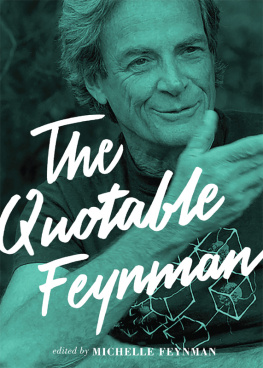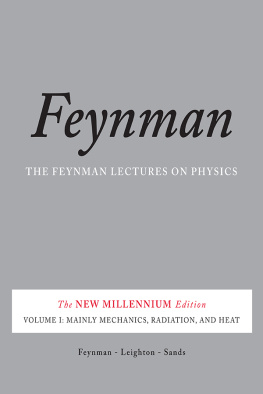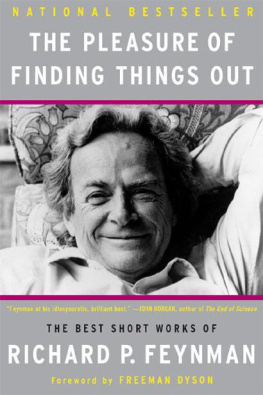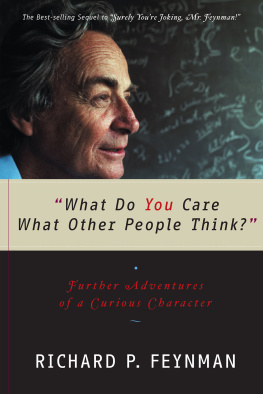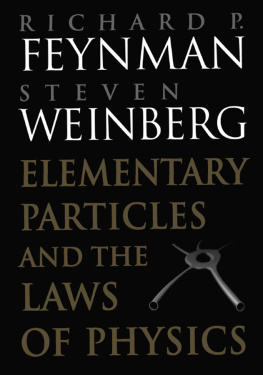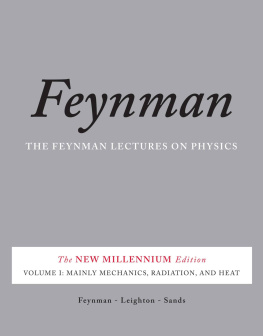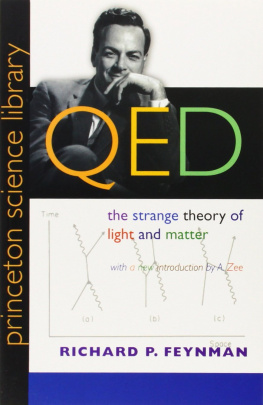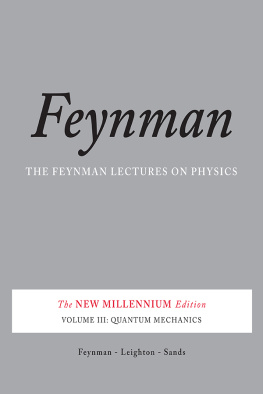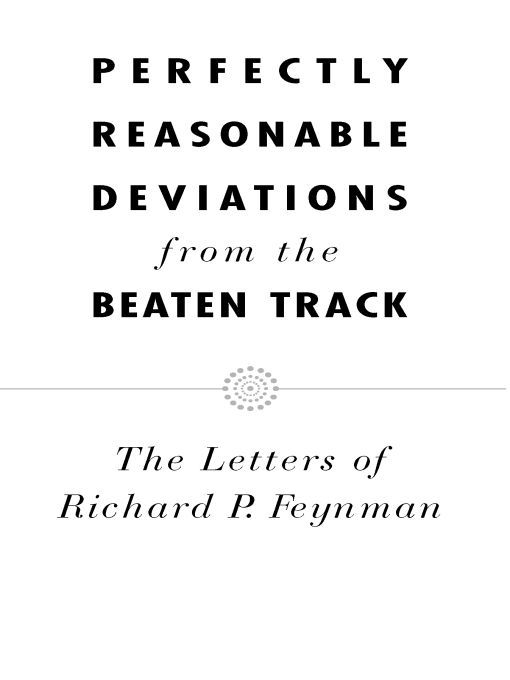Table of Contents
Praise for Perfectly Reasonable Deviations from the Beaten Track
Few books really are a joy to read. This one, full of charm and wisdom, truly is.New Scientist
[A] remarkable set of letters.Nature
This collection of letters shows us for the first time the son caring for his father and mother, the father caring for his wife and children, the teacher caring for his students, the writer replying to people throughout the world who wrote to him about their problems and received his full and undivided attention.Freeman Dyson, New York Review of Books
All that was left were his letters.With the publication of Perfectly Reasonable Deviations from the Beaten Track, we get Feynman directfrom his mind to the stationery and into the envelope. Compiled by his daughter, Michelle Feynman, the result is a labor of love and, at times, too much of a good thing.... Feynman often insisted that he couldnt write. Now we know better. It was another of his jokes.Los Angeles Times Book Review
I have never read anything like this.... Anyone who is not teary-eyed after finishing it has been skimming.American Scientist
You dont have to know much about physics to scarf down Perfectly Reasonable Deviations from the Beaten Track: The Letters of Richard P. Feynman and the heartbreaking missive he wrote to his dead wife.
Chicago Tribune
Perfectly Reasonable Deviations from the Beaten Track: The Letters of Richard P. Feynman makes palpable the legend that surrounds this Nobel laureate and Caltech physics professor nonpareil. His correspondence affords the intimate yet respectful conversation with a genius usually reserved for a close friend or member of the family.Christian Science Monitor
Just when you thought the fount of Feynmaniana had run dry comes this splendid collection of letters assembled and introduced by adopted daughter Michelle.... Feynman describes his elation at discovering a new law of physics: There was a moment when I knew how nature worked. It had elegance and beauty. The goddam thing was gleaming.... That Gleam shines through here.Kirkus, starred review
A delightful compilation of letters.Skeptical Inquirer
[Feynmans] hearty commitment to science, healthy disrespect for conformity, and terrific love of life come across in his letters, giving the impression of an intellectual adventurer. And although there is no plot or even much connectedness to speak of between sections, this quality gives the book a certain livelinessits fun to get to know Feynman.
Bulletin of Atomic Scientists
BOOKS BY RICHARD P. FEYNMAN
The Character of Physical Law
Elementary Particles and the Laws of Physics:
The 1986 Dirac Memorial Lectures
(with Steven Weinberg)
Feynman Lectures on Computation
(edited by Anthony J. G. Hey and Robin W. Allen)
Feynman Lectures on Gravitation
(with Fernando B. Morinigo and William G. Wagner;
edited by Brian Hatfield)
The Feynman Lectures on Physics
(with Robert B. Leighton and Matthew Sands)
The Meaning of It All:
Thoughts of a Citizen Scientist
The Pleasure of Finding Things Out:
The Best Short Works of Richard P. Feynman
QED: The Strange Theory of Light and Matter
Quantum Mechanics and Path Integrals
(with A. R. Hibbs)
Six Easy Pieces:
Essentials of Physics Explained by Its
Most Brilliant Teacher
Six Not-So-Easy Pieces:
Einsteins Relativity, Symmetry, and Space Time
Statistical Mechanics: A Set of Lectures
Surely Youre Joking, Mr. Feynman!
Adventures of a Curious Character
(with Ralph Leighton)
The Theory of Fundamental Processes
What Do You Care What Other People Think?
Further Adventures of a Curious Character
(with Ralph Leighton)
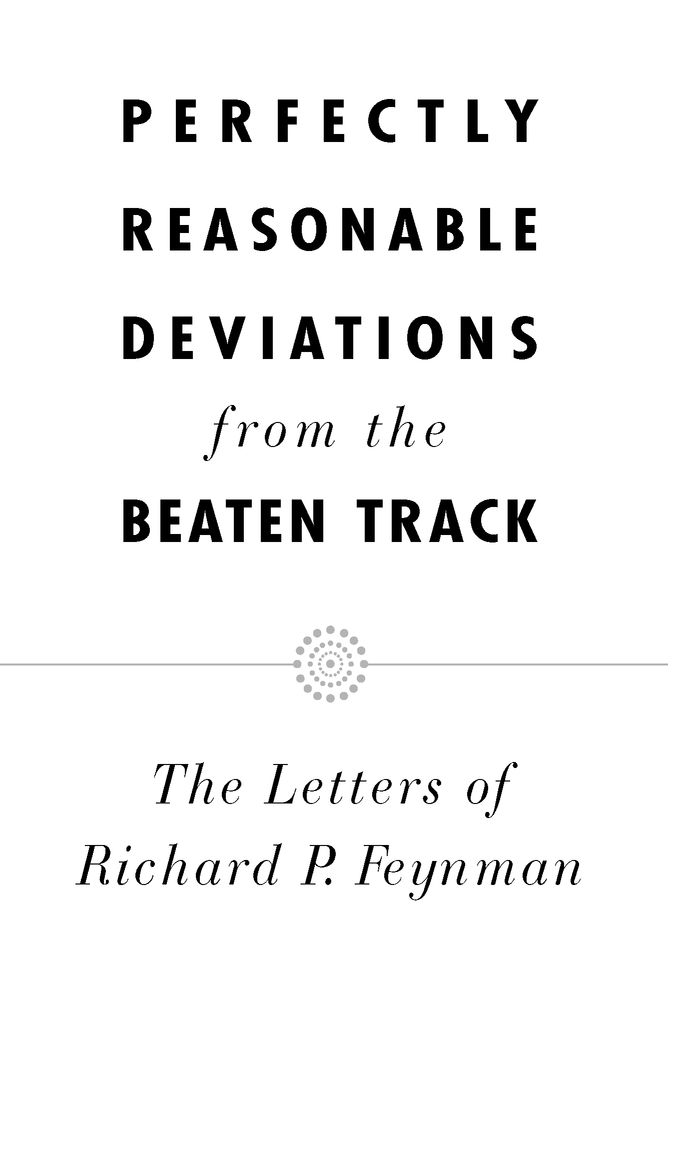
Edited and with Additionnal Commentary by
Michelle Feynman
Foreward by
Timothy Ferris
A MEMBER OF THE PERSEUS BOOKS GROUP NEW YORK
For my parents, Richard and Gweneth
For my nieces, Rachel and Emma,
and my children, Ava and Marco,
so that they may better know
their grandfather
FOREWORD
Richard P. Feynman was both a first-rate and a famous physicist.The combination is by no means inevitable. For every Nobel Laureate in physics who became a public figurefor every Marie Curie, Albert Einstein, or Werner Heisenbergothers of exemplary stature did not: Paul Dirac, Wolfgang Pauli, and Subrahmanyan Chandrasekhar, for instance. Its not always clear what made the difference.Why was Feynman famous?
Extraneous circumstances can, of course, determine on whom the spotlight falls. Heisenbergs uncertainty principle resonated with an age of philosophical and psychological uncertainty for reasons having little to do with its importance to quantum mechanics. Marie Curies research into radioactivity demonstrated that a woman could advance to the loftiest tiers of science. The spectacle of an English expedition confirming Einsteins general theory of relativityby measuring the bending of starlight passing near the sun during the total solar eclipse of 1919raised hopes of a more rational, peaceful future among nationalities exhausted by the carnage of the Great War. But such considerations do little to explain the fame of Feynman, who worked on the Manhattan Project but who otherwise seldom made headlines, and whose research, though highly regarded by his fellow physicists, could scarcely be understood, much less appreciated, by the general public.
Personality can play a role, and some of Feynmans critics accused him of carefully crafting a vivid persona in order to raise his profile. One close colleague objected to what he called Feynmans extraordinary efforts to be differentespecially from his friends and colleagues, adding that Feynman surrounded himself with a cloud of myth, and he spent a great deal of time and energy generating anecdotes about himself. It is true that Feynman spoke unvarnished, blue-collar Brooklynese, that he played the bongos, liked to sketch dancers in topless bars, and otherwise presented himself as something of a raffish guy. But such behavior is commonplace.As Oscar Wilde observed, The first duty in life is to assume a pose. What the second duty is, no one has yet found out. Since every faculty has its share of poseurs, to accuse Feynman of posing hardly accounts for his having been the subject of plays, movies, and bestselling books.
Speaking as someone who knew him slightly, heard him speak on a number of occasions, and followed his research fairly closely, it seems to me that the key to understanding Feynmans appeal resides less in external circumstances or extracurricular activities than in his core conduct as a working scientistspecifically, that his freedom, integrity, and enthusiasm reflected the spirit of science in action.
Scientists cherish freedom as both a prerequisite and a perquisite of their chosen careers, and Feynman certainly reveled in his liberty. I am completely free, and there are no levers that can be used to influence me, he wrote home in 1986, while serving on the presidential commission investigating the



